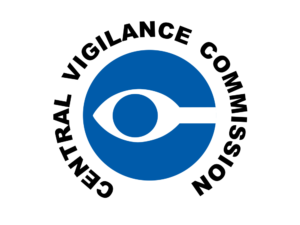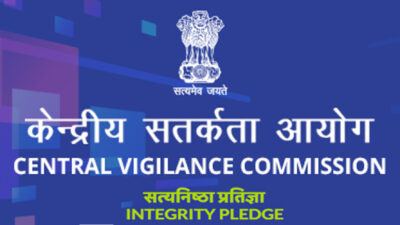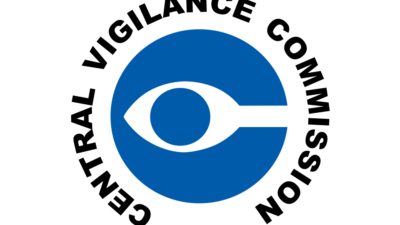Central Vigilance Commission

The Central Vigilance Commission was set up by the Government in February,1964 on the recommendations of the Committee on Prevention of Corruption, headed by Shri K. Santhanam, to advise and guide Central Government agencies in the field of vigilance.
CVC are conceived to be the apex vigilance institution, free of control from any executive authority, monitoring all vigilance activity under the Central Government and advising various authorities in Central Government organizations in planning, executing, reviewing and reforming their vigilant work. Consequent upon promulgation of an Ordinance by the President, the Central Vigilance Commission has been made a multi member Commission with “statutory status” with effect from 25th August, 1998. The CVC Bill was passed by both the houses of Parliament in 2003 and the President gave its assent on September 11, 2003. Thus the Central Vigilance Commission Act 2003 (No. 45 0f 2003) came into effect from that date.
Vigilance means to ensure clean and prompt administrative action towards achieving efficiency and effectiveness of the employees in particular and the organization in general, as lack of Vigilance leans to waste, losses and economic decline.
The Supreme Court in the judgement of Vineet Narain & Others vs. Union of India (1997), gave directions regarding the superior role of CVC. In this case the role of the Central Bureau of Investigation was criticised and the court directed that CVC should be given a supervisory role over CBI.
In 2013, the Parliament enacted the Lokpal and Lokayuktas Act, 2013. This act has amended CVC Act, 2003 whereby the Commission has been empowered to conduct preliminary inquiry and further investigation into complaints referred by the Lokpal.
The Commission shall consist of:
-
A Central Vigilance Commissioner – Chairperson;
-
Not more than two Vigilance Commissioners – Members;
Video GOI Resolution on “Public Interest Disclosure and Protection of Informer” dated April 2004, the Government of India has authorized the Central Vigilance Commission as the “Designated Agent” to receive written complaints for disclosure on any allegation of corruption or misuse of office and recommend appropriate action.
Functions and powers of the Central Vigilance Commission under the Central Vigilance Commission Act, 2003
-
Exercise superintendence over the functioning of the Delhi Special Police Establishment (CBI) insofar as it relates to the investigation of offences under the Prevention of Corruption Act, 1988; or an offence under the Cr.PC for certain categories of public servants – section 8(1)(a);
-
Give directions to the Delhi Special Police Establishment (CBI) for superintendence insofar as it relates to the investigation of offences under the Prevention of Corruption Act, 1988 – section 8(1)(b);
-
To inquire or cause an inquiry or investigation to be made on a reference by the Central Government – section 8(1)(c);
-
To inquire or cause an inquiry or investigation to be made into any complaint received against any official belonging to such category of officials specified in sub-section 2 of Section 8 of the CVC Act, 2003 – section 8(1)(d);
-
Review the progress of investigations conducted by the DSPE into offences alleged to have been committed under the Prevention of Corruption Act, 1988 or an offence under the Cr.PC – section (8)(1)(e);
-
Review the progress of the applications pending with the competent authorities for sanction of prosecution under the Prevention of Corruption Act, 1988 – section 8(1)(f);
-
Tender advice to the Central Government and its organizations on such matters as may be referred to it by them – section 8(1) (g);
-
Exercise superintendence over the vigilance administrations of the various Central Government Ministries, Departments and Organizations of the Central Government – section 8(1)(h);
-
Shall have all the powers of a Civil court while conducting any inquiry – section 11;
-
Respond to Central Government on mandatory consultation with the Commission before making any rules or regulations governing the vigilance or disciplinary matters relating to the persons appointed to the public services and posts in connection with the affairs of the Union or to members of the All India Services – section 19.
-
The Central Vigilance Commissioner (CVC) is the Chairperson and the Vigilance Commissioners (Members) of the Committee, on whose recommendations, the Central Government appoints the Director of Enforcement – section 25.
-
The Committee concerned with the appointment of the Director of Enforcement is also empowered to recommend, after consultation with the Director of Enforcement appointment of officers to the posts of the level of Deputy Director and above in the Directorate of Enforcement – section 25;
-
The Central Vigilance Commissioner (CVC) is also the Chairperson and the Vigilance Commissioners (Members) of the Committee empowered to recommend after consultation with the Director (CBI), appointment of officers to the post about the level of SP and above except Director and also recommend the extension or curtailment of tenure of such officers in the DSPE (CBI) – Section 26 and Section 4C of DSPE Act, 1946.
Limitations of CVC
- CVC is often considered a powerless agency as it is treated as an advisory body only with no power to register criminal case against government officials or direct CBI to initiate inquiries against any officer of the level of Joint Secretary and above.
- Although CVC is “relatively independent” in its functioning, it neither has the resources nor the power to take action on complaints of corruption.





Add Comment